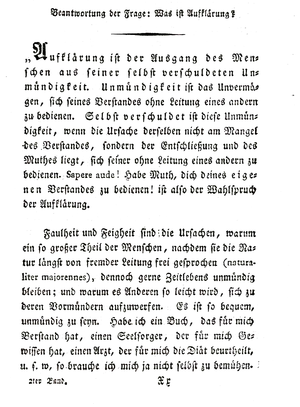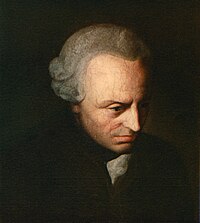
| Part of a series on |
| Immanuel Kant |
|---|
 |
|
Category • |
"Answering the Question: What Is Enlightenment?" ( German: Beantwortung der Frage: Was ist Aufklärung?), often referred to simply as "What Is Enlightenment?", is a 1784 essay by the philosopher Immanuel Kant. In the December 1784 publication of the Berlinische Monatsschrift (Berlin Monthly), edited by Friedrich Gedike and Johann Erich Biester, Kant replied to the question posed a year earlier by the Reverend Johann Friedrich Zöllner, who was also an official in the Prussian government. Zöllner's question was addressed to a broad intellectual public community, in reply to Biester's essay titled "Proposal, not to engage the clergy any longer when marriages are conducted" (April 1783). A number of leading intellectuals replied with essays, of which Kant's is the most famous and has had the most impact. Kant's opening paragraph of the essay is a much-cited definition of a lack of enlightenment as people's inability to think for themselves due not to their lack of intellect, but lack of courage. [1] [2] [3] [4]
See also
- Age of Enlightenment
- Anti-intellectualism
- Golden Age of Freethought
- Higher criticism
- Natural philosophy
- Public reason
- Self-efficacy
- What Is Enlightenment? (Foucault)
References
- ^ Foucault, Michel (1984). "What is Enlightenment?". The Foucault Reader. New York: Pantheon Books. pp. 32–50. ISBN 0394529049. OCLC 10021125.
- ^ Schmidt, James, ed. (1996). What is Enlightenment?: Eighteenth-Century Answers and Twentieth-Century Questions. Philosophical Traditions. Vol. 7. Berkeley: University of California Press. doi: 10.1525/9780520916890. ISBN 0520202252. JSTOR 10.1525/j.ctt4cgf8z. OCLC 33664863.
- ^ Fleischacker, Samuel (2013). What is Enlightenment?. Kant's Questions. London; New York: Routledge. doi: 10.4324/9780203070468. ISBN 9780415486064. OCLC 607983318.
- ^ Harpham, Geoffrey Galt (1994). "So... What is Enlightenment? An Inquisition into Modernity". Critical Inquiry. 20 (3): 524–556. doi: 10.1086/448724. JSTOR 1343868.
Further reading
- Kant, Immanuel (1999) [1784]. "An answer to the question: What is enlightenment?". In Mary J. Gregor (ed.). Practical Philosophy. The Cambridge Edition of the Works of Immanuel Kant. Cambridge, UK; New York: Cambridge University Press. pp. 11–22. doi: 10.1017/CBO9780511813306.005. ISBN 9780521654081. English translation and commentary.
- Siskin, Clifford; Warner, William, eds. (2010). This is Enlightenment. Chicago: University of Chicago Press. doi: 10.7208/chicago/9780226761466.001.0001. ISBN 9780226761473. OCLC 457149493.
- Schmidt, James (2017). "What sort of question was Kant answering when he answered the question: 'What is enlightenment?'?". In Boucher, Geoff (ed.). Rethinking the Enlightenment: Between History, Philosophy, and Politics. Lanham, MD: Lexington Books. pp. 89–112. ISBN 9781498558129. OCLC 1005697529.
External links
- An Answer to the Question: What is Enlightenment? Translated by Ted Humphrey. Annotated. Hackett Publishing, 1992.
- An Answer to the Question: 'What is Enlightenment? (with endnotes). Evergreen State College, 1994.

| Part of a series on |
| Immanuel Kant |
|---|
 |
|
Category • |
"Answering the Question: What Is Enlightenment?" ( German: Beantwortung der Frage: Was ist Aufklärung?), often referred to simply as "What Is Enlightenment?", is a 1784 essay by the philosopher Immanuel Kant. In the December 1784 publication of the Berlinische Monatsschrift (Berlin Monthly), edited by Friedrich Gedike and Johann Erich Biester, Kant replied to the question posed a year earlier by the Reverend Johann Friedrich Zöllner, who was also an official in the Prussian government. Zöllner's question was addressed to a broad intellectual public community, in reply to Biester's essay titled "Proposal, not to engage the clergy any longer when marriages are conducted" (April 1783). A number of leading intellectuals replied with essays, of which Kant's is the most famous and has had the most impact. Kant's opening paragraph of the essay is a much-cited definition of a lack of enlightenment as people's inability to think for themselves due not to their lack of intellect, but lack of courage. [1] [2] [3] [4]
See also
- Age of Enlightenment
- Anti-intellectualism
- Golden Age of Freethought
- Higher criticism
- Natural philosophy
- Public reason
- Self-efficacy
- What Is Enlightenment? (Foucault)
References
- ^ Foucault, Michel (1984). "What is Enlightenment?". The Foucault Reader. New York: Pantheon Books. pp. 32–50. ISBN 0394529049. OCLC 10021125.
- ^ Schmidt, James, ed. (1996). What is Enlightenment?: Eighteenth-Century Answers and Twentieth-Century Questions. Philosophical Traditions. Vol. 7. Berkeley: University of California Press. doi: 10.1525/9780520916890. ISBN 0520202252. JSTOR 10.1525/j.ctt4cgf8z. OCLC 33664863.
- ^ Fleischacker, Samuel (2013). What is Enlightenment?. Kant's Questions. London; New York: Routledge. doi: 10.4324/9780203070468. ISBN 9780415486064. OCLC 607983318.
- ^ Harpham, Geoffrey Galt (1994). "So... What is Enlightenment? An Inquisition into Modernity". Critical Inquiry. 20 (3): 524–556. doi: 10.1086/448724. JSTOR 1343868.
Further reading
- Kant, Immanuel (1999) [1784]. "An answer to the question: What is enlightenment?". In Mary J. Gregor (ed.). Practical Philosophy. The Cambridge Edition of the Works of Immanuel Kant. Cambridge, UK; New York: Cambridge University Press. pp. 11–22. doi: 10.1017/CBO9780511813306.005. ISBN 9780521654081. English translation and commentary.
- Siskin, Clifford; Warner, William, eds. (2010). This is Enlightenment. Chicago: University of Chicago Press. doi: 10.7208/chicago/9780226761466.001.0001. ISBN 9780226761473. OCLC 457149493.
- Schmidt, James (2017). "What sort of question was Kant answering when he answered the question: 'What is enlightenment?'?". In Boucher, Geoff (ed.). Rethinking the Enlightenment: Between History, Philosophy, and Politics. Lanham, MD: Lexington Books. pp. 89–112. ISBN 9781498558129. OCLC 1005697529.
External links
- An Answer to the Question: What is Enlightenment? Translated by Ted Humphrey. Annotated. Hackett Publishing, 1992.
- An Answer to the Question: 'What is Enlightenment? (with endnotes). Evergreen State College, 1994.